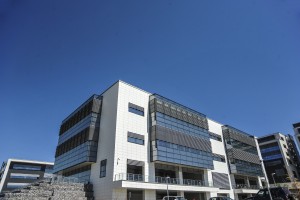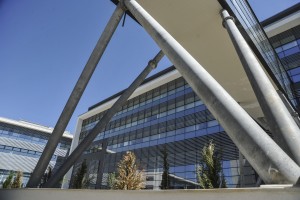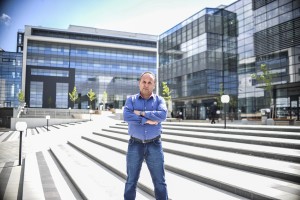The Palace of Justice, the European Commission’s most expensive project in Kosovo, has been plagued by facility malfunctions, lack of air and improper maintenance since day one.
An imposing grey glass building stands out in the suburbs of Kosovo’s capital, in a recently developed part of Prishtina. This is the 27 million euro Palace of Justice inaugurated in March last year only to become a symbol of the dysfunction of rule of law in Kosovo.
A European Commission donation, co-paid by Kosovar taxpayers, the Palace has become infamous for its lack of proper ventilation and malfunctioning facilities, which include heating and elevators. The Palace, considered one of the the biggest investments of the EC in Kosovo, is supposed to house seven different courts. Both local and the international EULEX staff, including judges, prosecutors, and other legal aides, have been complaining about the conditions in the complex since day one.
Common complaints include the lack of air in the Palace, where as a result an employee passed out; problems with heating (the temperature is inconsistent throughout the building, with some tenants freezing, while others cannot stand the heat); an elevator falling with people trapped inside or several incidents of elevators breaking with judges and prosecutors stuck inside.
There were also problems with shelves falling in the archive and a few offices were flooded during rainy days, endangering court files.
As a result of the complaints about air quality, employees have protested several times in the past two years.
“We’ve faced a lot of issues that shouldn’t be there: we have an issue with the temperature in the building, we still have a problem with elevators,” says Hamdi Ibrahimi, the head of the Basic Court of Prishtina. Although he appreciates the EC’s donation, he complains that the construction of the palace was carried out with many flaws.
To address the staff’s complaints, the EU Office in Kosovo ordered an independent assessment of the air quality in the Palace last September. Dinka Zivalj, a spokesperson for the EU Special Representative in Kosovo, said that they had engaged an international company which conducted two studies. Their analyses did not detect any problems.
Yet Ibrahimi insists that the problems are very real.
“We don’t even know how many people can be accommodated here,” Ibrahimi exclaimed, suggesting that the air problems might also be due to overcrowding.
Luis Palmiera, the engineer who oversaw the construction of the building, agrees. The palace was thought to house 600 people, but now twice as many are working inside.
“Rooms that were designed for one to two people are being used by three to four people,” Palmiera said.
In an office, BIRN encountered a door that was being held open by a fire extinguisher that had been taken out of its place.
Gezim Kelmendi, the engineer who has worked in the building explained that people are doing this to keep the doors open because there is not enough air in the rooms.
According to Ibrahimi, the air problem can be solved by simply placing a window in each office.
BIRN’s annual court monitoring report found that the situation is exacerbated by employees who smoke inside, which is not only against the rules but also hazardous. Ibrahimi denied these claims.
“It’s a blatant lie. They don’t smoke inside. They smoke in the stairwells,” he said.
Defect elevators
Rosen Milkov, representative of GBS, the contracted company that built the Palace of Justice, is also not without complaints.
Milkov claims that his company lost 14 million euros building this Palace.
“We were in the position three times to terminate the contract… but the position of our high level management was anyway to finish this contract and to show that GBS is not a company that leaves its job regardless of the final result,” the Bulgarian businessman explained.
At the moment he says the building is in the “defect identification period” and that it is “absolutely reasonable and expected that some defects could appear.”
Probably the most dysfunctional facilities are the elevators. However, Kelmendi claims that the elevator problem is not exclusive to the Palace.
“There’s no authorities to certify elevators,” he finds as the root cause of this problem.
“There’s no [proper] ventilation in the elevators. We get stuck here, within three minutes there’s no more oxygen, the air gets stuffy,” says Kelmendi.
Inconsistent heating issues
“The temperature in my office is 27.5 degree Celsius,” complains the head of the Basic Court Ibrahimi in exasperation.
It turns out, the temperature management system has been turned off.
Kelmendi, the building’s mechanical engineer explains that when someone leaves the office, the system gets turned off automatically. But other cases reported to BIRN monitors have also emphasized this issue.
The Palace has a geothermal system for cooling and heating with 200 pumps and 200 drillings, a two-piped system. However this system does not give the option of cooling and heating at the same time, like a four-piped system would.
Palmiera, the engineer who oversaw the construction of the building, does not agree that the ventilation system is the issue. Nevertheless he admits that the two pipe system is more demanding in terms of how it is operated.
The developer Milkov, on the other hand, explains that the two-pipe system was a required technical specification in their contract.
He did raise the issue that this two-pipe system will create problems with the temperature in the building, and sent them to Indegia, the supervising company at the time.
BIRN saw the document where Milkov had said that the two pipe system will be inadequate for a building of this size.
Milkov explained that when the EC is notified by the engineers and the contractors of a possible change that is needed, the contract could be changed by a simple ‘variation order’. Yet, the EC did not issue such an order to upgrade the ventilation system.
“The change would have cost between one and two million euros,” Milkov said.

Photo Atdhe Mulla.
Both Milkov, and Palmiera criticize the way the palace is being maintained.
“The building needs to be maintained better, specifically the filters.”
Kelmendi explains that during construction, the filters were cleaned and replaced repeatedly and they should have continued to be cleaned.
Since Kosovo judiciary has moved into the building the ventilation filters were not replaced until months later, after the first complaints about the lack of air came pouring in, reported Kelmendi.
“They don’t replace the filters. They simply wash them with water,” said Milkov.
The supervising engineer Palmiera complained that the maintenance company that was contracted by the Ministry of Public Administration does not do adequate work.
“They leave at 3 p.m. and I’ve never seen them work on Saturdays or Sundays,” he said.
He also complained that there are no specialized people managing the system.
Milkov explained that after 20 people were trained to maintain the building, they never came back.
“My explanation is that they were not part of the staff of the managing company which had been contracted by the employer,” says Milkov.
Adea Kondirolli contributed to this story.







